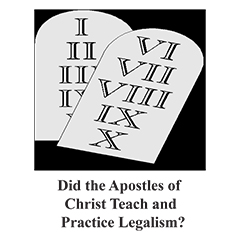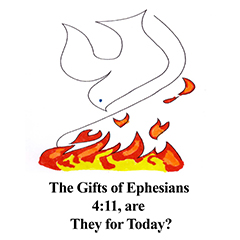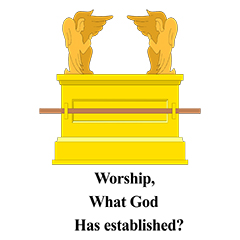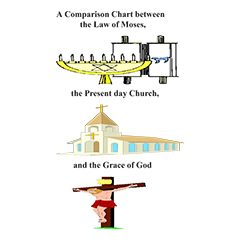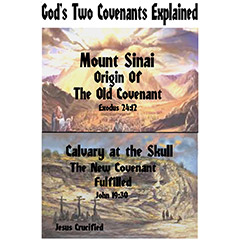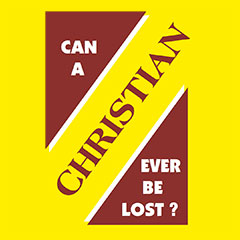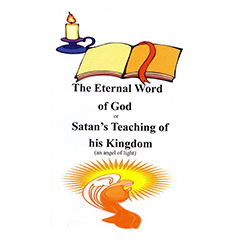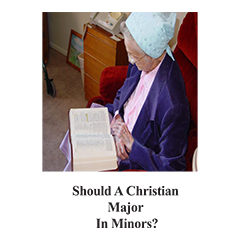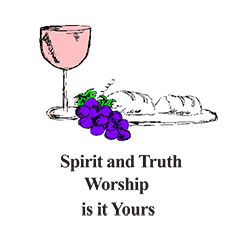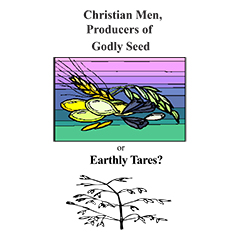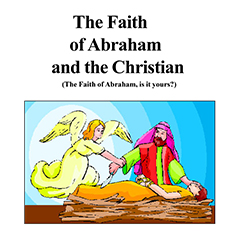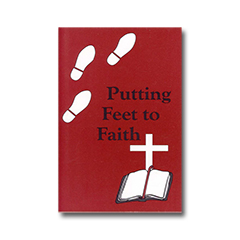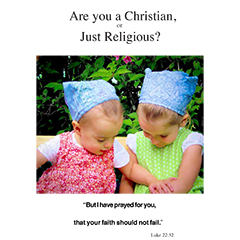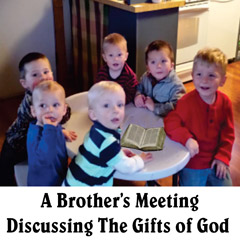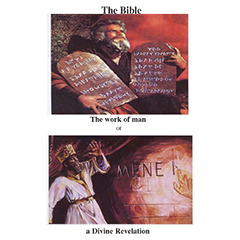Booklet Categories
Our Booklets
Would you like to send our FREE booklets to a prisoner that you may know.
Please send us a Request, we’ll add them to our monthly mailing list.
Visitors:
Legalism In The House Of God

Are you guilty?
Index
-
- Where does the term legalism come from?
- What does the Spirit of God teach regarding legalism?
- To an individual?
- In the Church?
- Is Adam (man’s Adamic nature) hiding under the guise of liberty?
- Is the flesh ruling through grace?
- Is following the Apostles’ Doctrine legalism?
- How does one get free of legalism?
- Conclusion
Preface
The Christian is called upon by God to live according to the leading of the Holy Spirit. For the Christian to walk after the Spirit, judgment and discernment are necessary. This involves the Christian’s own walk, and his walk with other believers in an assembly.
Judaism, with its foundation in the Law of Moses, became a part of the Church almost from its inception. Judaism in the Church destroys its mission, hinders and perverts the leading of the Spirit. This is the message the Apostle Paul taught in his epistle to the Galatians. This booklet will put light on the foundation of legalism in the churches. Most people are not aware of the spiritual damage legalism has caused to the purposes of God for His Church. It is the major undermining doctrine in the churches today.
First, for the Christian who becomes aware of this, walking in the Spirit is mandatory in order to discern what is of Christ, and what is not of Christ (John 10:27; Galatians 3:1-5; 5:7-9). Every Christian is responsible to follow the Holy Spirit and Scripture in making this discernment. Second, the Christian must exercise judgment according to truth, to walk in the Spirit (1 Corinthians 11:31-32; 2 Corinthians 13:5; 1 Peter 4:17). Jesus tells us that God is a Spirit (John 4:24).
Those who would follow Jesus do so by allowing the Holy Spirit to lead them into the truth of God in Christ. If a Christian does not walk in the Spirit, formalism, liberalism, intellectualism, legalism, license, philosophies, and many other teachings and doctrines will prevail, and the person of the Christ will be put aside.
A Christian is called upon to discern and judge the moral and spiritual character as well as and the direction of any Christian assembly (1 Corinthians 5:9.13; 10:6, 21-22; 2 Timothy 2:19-22). If believers in an assembly do not make self and corporate judgments, it is possible for anything to happen, and in our day it does happen. A continual study of Scripture is the Christian’s best insurance against falling prey to the many diverse trails in Christendom today.
1. Where does the term legalism come from?
Legalism is a word often heard today in the company of God’s people. It may surprise many to find that the word is not found in the Old Testament or in the New Testament. The word is a conjugation of two parts. ‘Legal’ means ‘law’ and the addition of the suffix ‘ism’ makes the word an active noun. The word legal-ism used in this way relates to religious individuals, present day doctrine in churches, legal practices, and governmental structure of and in churches.
Today, individuals and the quasi-governmental structure of many churches are adhering to some teachings out of the Law of Moses and some teachings from the gospel of Christ for their understanding and practice in relationship to God. Most people in the churches are not aware of the legalism in which they are putting their faith and hope. Because the name of Jesus is invoked, they assume all is well.
Romans 7:12 teaches us this; “Therefore the law is holy, and the commandment holy, and just, and good.” It is the natural Adamic man inside the person that is attracted to the Law of Moses. The Adamic man is deceived by the religious direction of following the Law – it seems right to him. The favor of God is not found in following or adhering to the Law of Moses (Galatians 3:1-5, 10). Involving one’s self with the Law of Moses knowingly or unknowingly, is not from the Spirit of God. The favor of God is only found in His Son. “And by Him all that believe are justified from all things, from which you could not be justified by the Law of Moses” (Acts 13:39). Contrary to the truth of this Scripture are those who are following law doctrine or law practices, either as individuals or in a church structure. This brings in a little poison, which results in death (Romans 7:9-10; 2 Corinthians 3:7; Galatians 5:4). A Christian should ask, “Can a man take fire to his bosom, and his clothes not be burned?” (Proverbs 6:27). Jesus said that He came to give “abundant life.” In the law only death and condemnation will be the fruit thereof (Romans 8:2; 2 Corinthians 3:7, 9;).
2. What does the Spirit of God teach regarding legalism?
Scripture teaches us the Mind of God for His people. With Israel it was found in the Law of Moses. The Law of Moses was given to Israel because they were a people without faith (Deuteronomy 32:20). However, they were still God’s chosen earthly people (Deuteronomy 7:6). God gave the Law of Moses to Israel, to show them they could not keep it (John 7:19; Acts 7:53). Israel did not comprehend of themselves, that they were men after the flesh; so, they boasted that they would keep the law (Exodus 19:8; 24:7). Israel preferred the Law of Moses rather than believing God in faith (Exodus 19:8; 24:3).
God giving Israel the law resulted in human failure. This failure was to show Israel their unrighteous state, which should have shown them their need of a Saviour. If Israel kept the law it did not make them acceptable to God in an eternal state (Romans 3:20; 8:3; Hebrews 7:19). When Israel attempted to keep the law, Israel benefited in earthly values and material possessions, not in eternal spiritual blessings.
Western governments go back to the Law of Moses for the foundation of their judiciary laws. All people who keep these laws benefit in a secular way. However, any person keeping the Law of Moses, will not be made acceptable to God (Galatians 3:11). All men are under the curse of sin before God, and the keeping of the Law of Moses will not change that (Romans 3:9-20).
a. To an individual
There are 613 commandments in the Law of Moses. These commandments were not given to Gentiles. If an Israelite or anyone attempts to keep one of these commandants, he is obligated to keep all of them (Deuteronomy 27:26; Galatians 3:10-12, 5:1-3; James 2:10-11). For instance, many people think God will spiritually bless them if they tithe. However, a person keeping the law of tithing (Leviticus 27:30-34) is also obligated to keep the other 612 commandments as well (Galatians 5:3). Another person may think the Law of Moses is a good principle to live by. However, the Law is a principle of death (Romans 7:10-14), for with the violation of law, comes a penalty. With the Law of Moses, the penalty is spiritual death while the body still lives (2 Corinthians 3:7). If Israel kept the law, they would live in earthly physical blessings (Deuteronomy 28:1-14). If Israel did not keep the law, a curse would be their lot. Israel did not keep the law; therefore they lived under a curse (Deuteronomy 28:15.68; 31:16-21).
A Christian is never told to keep the Law of Moses or to live under it. A Christian is encouraged to keep the law of liberty (James 1:25). Many people think that God will favor them if they keep the Ten Commandments or some part of the commandments. Those who try to do this may have a more balanced life, but it will not bring them into the favor of God. “…for by the works of the law shall no flesh be justified.” (Galatians 2:16).
Because the Law of Moses is holy and just, men think there is spiritual life in attempting to keep the law. Quite the contrary is true, because all men are sinners, and guilty before God (Romans 3:19). There is only death in the law (Romans 7:10). The law reveals our sin nature and our sin.
God ordained something higher than the Law of Moses for a Christian. God sent Jesus to bring life, not death. “In Him was life; and the life was the light of men” (John 1:4). “…I have come that they may have life, and that they may have it more abundantly” (John 10:10).
For a person to follow Jesus, His grace is the entire position of the believers standing (saved by grace) and state (kept by grace) (Ephesians 2:8-9; 1 Peter 1:5). In this standing and state of grace, there is nothing a believer can do to improve it. We can only walk in the joy of it. This Scripture clarifies the gift of God without works on our part; “But if by grace, no longer of works: since (otherwise) grace is no more grace” (Romans 11:6 JND).
The Christian cannot become more spiritual by any effort he makes or work he does. The Christian can only become more spiritual (being formed into the image of Jesus) by faith in Christ (1 John 3:3). This process has nothing to do with the Christian’s strengths or works; “… for by strength no man shall prevail” (1 Samuel 2:9; 1 Corinthians 2:3-4). Believing the whole counsel of God as revealed in Scripture will cause spiritual growth to take place (Acts 20:27). The believer, exercising his faith, will come into the experience and joy of Christ by the Holy Spirit. The Law of Moses has no part in this work of the grace of God (Galatians 3:3).
Some people and churches confess that following Jesus is the pathway to eternal life. Then, they introduce the Law of Moses as a very important part of following Jesus. By doing this, they are inviting all who would follow them into a pathway of confusion, a curse and that which leads to death (2 Corinthians 3:7; Galatians 3:10-12). The cross of Jesus abolished the law of commandments totally and completely (Romans 10:4; Ephesians 2:15; Colossians 2:14).
b. In the church
God has called the Christian to be a pure reflection of His grace (Romans 8:29-30; 1 Thessalonians 2:12; 2 Thessalonians 2:8-15). God has also called every assembly of believers to be a mirror of His grace and mercy (Colossians 3:14-15; Ephesians 4:1). This work of the grace of God is intended to be seen, in the spiritual governmental structure of a Christian assembly, or gathering. For example, in the Law of Moses, God gave Israel instructions to install a hierarchy of priests. Their primary duty was to serve God in the tabernacle – later in the temple. Their secondary duty was to serve the people in the things of God, through the Law of Moses.
Their priesthood was of Aaron; the priest’s purpose to the people was:
-
-
- To be the instrument of God.
- To make known the Word of God to the people.
- To represent the people to God.
-
The High Priest carried the judgment for the children of Israel (Exodus 28:30). The High Priest spoke for God (Exodus 4:15). Once a year, on the Day of Atonement, the High Priest went into the holy of holies to sprinkle blood for the sins of the people, which had been committed in ignorance (Leviticus chapter 16; Hebrews 9:7). The sacrifices of the priests to God through an offering dealt with a particular sin committed by an Israelite. A priest with a blemish was not to have any function serving God in the tabernacle or the temple (Leviticus 21:16-24). These are a few of the responsibilities of Aaron and his son’s functioning in priesthood. In general, the priests were to be wholly serving God through the Law of Moses. The people were to be in subjection to the priests.
This law structure was entirely for man in the flesh (Galatians 3:19). The Law of Moses was not given for the man who believed God in faith (1 Timothy 1:9-10). This law structure was to end at the cross of Christ at Calvary. Jesus said on the cross, “it is finished” (John 19:30). The giving off the Holy Spirit on the day of Pentecost confirmed the fulfillment (John 19:30; Acts 2:1-4).
At the Church’s beginning the law was not imposed on Christian believers (Acts chapter 15). However, as the Church Age progressed, the Law of Moses began to take root in the churches. The Galatians, for example were unaware that they risked the loss of their liberty by becoming caught in the Judaizing trap (mingling law with grace to be perfected and be justified in salvation).
The Judaizing of the Church is evident to anyone who will study church history. Today, many people in the churches are under the structure of the Law of Moses; this takes place in church governmental structure. A comparison will be helpful.
Priests under the Law of Moses: God set Aaron, his sons and his descendants apart from the people as priests (Exodus 28:1). They were to perform the works of God as given to them in the Law.
In Christ all believers are priests: Jesus gave revelation of the Church and its function to His apostles’ and disciples. He instructs them, “But you be not called ‘Rabbi’; for One is your Teacher the Christ; and you are all brethren” (Matthew 23:8). We are instructed here that all of Christ’s own are equal before Him. In Matthew 23:10, Jesus taught His disciples that they are not to take on religious titles and positions to themselves. Under the Law of Moses, titles and positions were given of God (Exodus 29:5.9). In Matthew 23:11, Jesus expressed this truth, “But he who is greatest among you shall be your servant.” Matthew 23:12 instructs this way, “And whoever exalts himself (in a religious position) will be humbled (in the kingdom of God).” From these Scriptures (John 13:5.17; 2 Corinthians 2:17; 3 John 9-10), and many others, we learn that the positional office of clergy in the churches finds its foundation in the Law of Moses.
God has designed and prearranged something different apart from the Law of Moses, for the Church. He has given gifts unto men (Ephesians 4:8). The gifts of God given to His assembly are recorded in Ephesians 4:11; they are: apostles, prophets, evangelists, pastors, and teachers. These gifts are not man ordained, nor are these gifts clerical offices, but men ordained of God by the Holy Spirit. They are for the perfecting of the saints, for the equipping of the saints for the work of the ministry, and for the edifying of the body of Christ (Ephesians 4:12 JND).
The position of clergy in the churches today is founded and ordained by men, sanctioned by a denomination, sect, or religious body. It is a man made position based on the Law of Moses. The resurrected Christ in the midst of the seven churches rebuked clericalism in deed and doctrine, as it started to take root in the churches at Ephesus and Pergamos. “But this you have, that you hate the deeds of the Nicolaitanes, which I also hate” (Revelations 2:6,15). The word Nicolaitanes is composed of two words. The Greek word ‘Nikao’ means to rule over, or to conquer. The Greek word ‘Laos’ means the people or the Laity; the original meaning was the unbelieving people. What started in Ephesus (first century) as deeds later became a doctrine in Pergamos (316 A. D.). The law, rather than the grace of God, was introduced into the Church of God. It is hated of God because it serves the flesh and not the kingdom of Christ. This does not mean that some or many clergymen do not have a gift of pastor or teacher. It is the occupying of the law-based position of clergymen that is hated of Christ. The clergy is a priesthood of man’s making, founded on the separated priesthood of Aaron. The one man or a selected few men “in the ministry” in the churches, is a legal structure after the Law of Moses.
Priests: God chose Israel apart from law to be a nation of priests unto Himself (Exodus 19:5-6). Instead of being a nation of priests, Israel chose the Law of Moses, and a select priesthood (Exodus 19:8; 24:3; 28:1-4; Numbers 16:10). In a future millennial day, God will still have a nation of priests unto Himself in Israel (Isaiah 61:6).
In the kingdom of Christ, every Christian is a priest (1 Peter 2:5, 9; Revelation 1:6). The Christian’s priesthood is a spiritual priesthood, a gift of God. This priesthood is not after the priesthood of Aaron. The Christian’s priesthood is found in Christ. Christ’s priesthood was after Melchizedek, an eternal priesthood (Psalms 110:4). It had no beginning and it has no end (Hebrews 7:3). The Christian’s priesthood cannot be given or taken by man.
The main purpose of a priest is to minister to God. In Israel, the center of ministry was in the tabernacle, later the temple. This place of ministry for the priest was not under the authority of man, but of God. In this present Church Age the primary place of function for the believer-priest (every born again believer) is in the assembly (the *Church). Within the assembly is the place of exercise for his priesthood.
(*Assembly, i.e., any group of born again believers, gathered only to the name of the Lord Jesus, with no organized structural leader other than the Holy Spirit.)
The liberty of the Spirit gives freedom to all believers to minister and worship in the function of a priest (1 Corinthians 14:23-33). The exception is where the order of the government of God restricts. The Holy Spirit, giving unction (anointing) to the believer-priest to minister, is the normal Christian activity in the assembly.
In worship for example, every Christian brother has the authority of God to lead the assembly without the permission of men. Liberty of the Spirit, through the exercise of priesthood rather than the law system of clergy/laity, is the mind of God for His people. A priest (brother and sisters) has total access to God apart from man. The believer, exercising his priestly gift, is the mind of God for His saints.
The true Church of God is the pillar and ground of truth through the Spirit (1 Timothy 3:15). This true Church is not an organization founded upon the law as in many churches today, even though they have been founded by well meaning men. God’s design in Christ for the Church is an equal brotherhood of priests. The positional truth of a believer-priest eliminates the clergy/laity law structure. The priesthood functioning in equality allows any Christian brother to lead the assembly of God’s people during worship, without the permission of man. A Christian exercising his priesthood in this manner will have great joy in Christ. The assembly will be edified, and the spiritual government of God will be seen in this freedom of the liberty of the Spirit.
Jesus the center: In Israel, under the Law of Moses, the tabernacle was the center of meeting; this was because God was there (Exodus 40:34; Numbers 9:15.23). Gathering to a structure (tabernacle or temple) is what the Law of Moses designated. In churches today, men gather to religious structures as well. These structures are: hierarchy of clergy, denominations, independent sects, sanctuaries, doctrines, a good teacher, new age philosophy, etc. We learn in the first four chapters of 1 Corinthians that these structures are built on carnal foundations, (1 Corinthians 1:10-13; 3:3), not the Spirit of Christ (1 Corinthians 3:11).
The Law of Moses was given for carnal man (Galatians 3:19). For the Christian to live under these carnal structures as practiced in the churches, today, is to be under the principle of law, hence death (Romans 7:10). There is no life from the Spirit of Christ in the legal structures of carnal man. In contrast to these, John 1:1 tells us that Jesus is the center of all things. Further understanding of this truth is given to us in Colossians 1:15-19.
Gathering to Jesus in the liberty of the Spirit is the Christian’s true portion. Jesus said “For where two or three are gathered together unto My name, there am I in the midst of them” (Matthew 18:20 JND). Jesus did not promise to be in the midst of law-structured organizations of men. Gathering unto the person of Jesus alone is where true liberty in the Holy Spirit is found. To bring the Church of God into and under some part of the law only deceives those who are gathered into a coexistence with the law.
This coexistence with the law represses the work of the Holy Spirit among the people of God. These law structures of men become the commands and traditions of men (Mark 7:9). They put away the Word of God and the liberty of the Spirit. Gathering unto Christ, who is in the midst of His people, allows the liberty of the Spirit to bring forth life, without quenching the Spirit. This liberty gives unction to the believer-priest in the exercise of worship and gifts. This liberty allows the work of the Spirit to bring forth unrestricted growth in the Christian and in an assembly of believers. The law always brings forth death. Following Christ in the Spirit, through the Word of God, brings forth only life.
3. Is Adam (man’s Adamic nature) hiding under the guise of liberty?
“The heart is deceitful above all things, and desperately wicked; who can know it” (Jeremiah 17:9).
We should always remember that the Adamic nature within us is not spiritual, but it is very religious. The Adamic nature within us embraces the law to please God because it is something Adam can do. There is no cross of Christ in the law, so Adam in following the law, is comfortable and safe. In Romans 6:6, we are instructed the believer’s Adamic nature was crucified with Christ. To a believer, the crucified life becomes a reality by faith, as he rejects the law and follows the crucified and risen Christ. The Adamic nature within will go to any length to resist being crucified. It will reform, it will become religious, it will do good works, it will quote Scripture, it will take religious positions in the church, it will submit to baptism, and it will show up at the church on meeting days. It will do anything to keep from going to the cross. However, the Adamic nature cannot enter into the kingdom of God.
We learn this in 2 Corinthians 5:17 if anyone is in Christ he is a new creation (of God’s making). One might ask how we can know the difference between the new man in Christ and the old man Adam. Both of these men do many seemingly spiritual works. Two can be observed in the believer. First, a believer is told to “…reckon yourselves to be dead indeed to sin” (Romans 6:11). If the believer reckons himself dead unto sin there is nothing to feed the Adamic nature. The Adamic nature must eat to live. Carnality is its food, sin is its fruit. The things of Adam are not of faith, “whatever is not from faith is sin” (Romans 14:23). Second, if the Holy Spirit is alive in the believer, the life of Jesus will be seen and followed. The evidence of this life is in receiving all things written in Scripture.
When the devil tempted Jesus, Jesus quoted Deuteronomy 8:3 to him, “It is written, man shall not live by bread alone, but by every word that proceeds from the mouth of God” (Matthew 4:4). Scripture received into the heart will bring the believer into the very life of the new man in Christ (Ephesians 4:24; Colossians 3:10).
If the Holy Spirit is not given the freedom to bring forth the truth of Christ in all Scripture, Adam will live and thrive, and look very religious. The believer, receiving the whole counsel of God into the heart, is the Holy Spirit’s method of transforming the believer into the new man (Acts 20:27). The new man finds life in the Spirit and in Scripture. They bring forth Christ who is “life unto life” (2 Corinthians 2:16).
a. Is the flesh ruling through grace?
In churches today, the word legalism is applied to many teachings and practices. These teachings and practices are taught by Jesus or the apostles in the New Testament as truth for believers to follow.
For example, the New Testament teaches equality in a brotherhood of priests. A Christian, who would attempt to practice this priestly gift of God in the churches, would be labeled as out of order or following a heresy, unless he was appointed or anointed by man.
The woman’s place as taught by the apostles’ in today’s churches is called legalism. This occurs because how a person feels, is thought to be the point of truth rather than the Holy Scriptures. Unisex is the ideal model in the practice of this new age doctrine.
If it is taught in an assembly to limit the Lord’s Table to believers only, many would call that truth a legal spirit. However, the truths that the apostles’ taught are instructions for the Church of God for all time, for saints to believe and practice in faith.
On the other side of the coin, the Adamic nature within a person can fully accept much of the legalism that is going on within churches today. For example, the feel good mentality in churches today is a snare for a believer. The Adamic mind reasons in this manner: I believe in Jesus, and I feel good, so anything that makes me feel uncomfortable is legalism, especially the New Testament teachings that point the Christian to the cross. After all, why teach what makes me uncomfortable? I am following Jesus internally, I don’t need to be subject to the letter of Scripture. God is not asking me to change externally. Christ and the apostles taught love. The imposing of the apostle’s teaching as the purpose and direction of life is the letter of the law and legalism. In this new age thinking, Adam has refined this defensive doctrine to a polished jewel.
However, the truth received into the heart of a believer as taught in Scripture, will put the Adamic nature to death (Romans 6:17-18). This, Adam will resist with all the power at his disposal. Adam may hide behind platitudes, philosophy, psychology, and good works. He may give lip service to known truth, and he may show up for every church meeting. He is willing to do anything religious to live and let live, so that death will not be his portion. Adam will most certainly brand anything as legalism that endangers the appearance of spirituality that he hides under. For Adam, the truth in Christ jeopardizes his very life.
Adam appeals to the doctrine of grace to keep himself from being discovered, and put to death. Adam uses the word legalism liberally. This he does in order to keep the cross of Christ as far away from himself as possible. Adam likes to feel good; so any truth of Christ or the cross of Christ threatens him. He will brand the life changing truths in Scripture as legalism. Adam is fully convinced that the cross of Christ could not be so uncaring and cruel as to put him to death. After all, did not Jesus die for everyone, even Adam? Besides that, Adam is behaving himself, so why this unjustified war against him? Isn’t the grace of God for all God’s creatures? This reasoning as well as many more human reasoning’s are used to keep Adam alive, and to restrain the new man in Christ from taking over the believer’s life (Colossians 3:10).
Jesus said, “No servant can serve two masters; for either he will hate the one, and love the other; or else he will be loyal to the one, and despise the other. You cannot serve God and mammon” (Luke 16:13).
For the Christian who is attempting to walk after the Spirit, the present day doctrine (in the churches) of coexistence with Adam is death, with a religious veneer. The Holy Spirit, coexisting with the Adamic nature in the believer, is a place of deception and lifelessness, even though much religious zeal may be seen, and many spiritual sounding words are uttered. Adam, (man’s old nature) living a religious life in complete freedom, is death to a Spirit filled life. We learn in Scripture that Adam cannot enter into the kingdom of God because in the believer, Adam was crucified with Christ (Romans 6:6). We learn in Ephesians 4:22 that Adam is corrupt and unredeemable.
4. Is following the Apostle’s Doctrine legalism?
We are taught in Scripture that the Church of Christ is built upon the apostles and prophets, with Christ Himself, as the Chief Cornerstone (Ephesians 2:20). We are further taught the Holy Spirit is the agent who does this work (Ephesians 2:22; Philippians 2:13). The Holy Spirit does His work through the truth in Christ. This has been instructed to us through the teaching of Christ and the apostles.
The unbelieving world has invaded and infiltrated churches of today. The Word of God, which the apostles taught, is seen by these religious sects as culture or legalism. Many of these people believe we live in a new age. These people believe that these truths, which the Holy Spirit taught through Scripture, no longer apply to anyone. They also hold that Christians, who believe and practice the apostles’ teachings, are under law or legalism. However, we learn this in Scripture: “All Scripture is given by inspiration of God, and is profitable for doctrine, for reproof, for correction, for instruction in righteousness” (2 Timothy 3:16). In Romans 2:16 the Apostle Paul instructs in these words: “In the day when God will judge the secrets of men by Jesus Christ, according to my gospel.” The apostles’ teaching is the Word of God (1 Thessalonians 2:13; 2 Peter 3:15-16).
Almost all cults and sectarian groups use Scripture to build their religious bodies. But they do not use all of the Scripture because it would destroy the very thing they are building. In contrast to man’s and Satan’s program, the Holy Spirit is using all Scripture to build a holy habitation of God (Ephesians 2:22). 1 Timothy 3:15 instructs us that the house of God, “…which is the Church of the living God, the pillar and ground of the truth;” is built on the fulfillment of all Scripture (Matthew 5:17-18; Luke 24:25-27, 48). It is also evident that Satan uses Scripture to undermine the work of the Spirit of God (Matthew 4:1-11; 2 Corinthians 11:13-15). It is through receiving into the heart, the spiritual knowledge of Christ made known through Scripture, that the believer is transformed into the image of Christ (Romans 8:29; 2 Timothy 3:15).
Many truths which the apostles taught are contrary to the world and worldly churches as well. Nevertheless, these truths which the apostles taught, are the power of God to transform a believer into the image of Christ. Receiving all the truths by faith, which the apostles,’ taught is the method God uses to free a believer from his carnal nature. A question one needs to ask is this: can a person reject what he does not want in the apostles’ doctrine, and still say he is following Christ? The evil in the human heart can, but a believer who desires Christ alone can not. The all-inclusive doctrines of the apostles, as revealed in Scripture, are the revelation of the Holy Spirit to His Church (Matthew 16:17; Galatians 1:12; 1 Peter 1:10.12).
It is said by many people today that; “the letter kills” (2 Corinthians 3:6). When the apostles’ instructions are expounded upon to believers, many believe the apostles’ instructions ‘kill’ and undermine the Spirit of Grace. In the thinking of many people this would be legalism. It is true that people can have a legal spirit in teaching the apostles’ doctrine, or even the doctrine of grace. However, it is a total misapplication of Scripture to apply ‘the letter kills,’ which is the Law of Moses, to the apostles’ doctrine. Yet, in the churches today this is widely taught. Is it taught so that Adam will not be threatened? The apostles’ doctrine is the revelation and life of God poured into His Church. The liberty of the Spirit is found in the very words of God, as revealed in Scripture. Let the reader decide if it is legalism to believe God. A person’s answer will decide the future of his spiritual growth.
5. How does one get free of legalism?
To get free of legalism, one must submit to the truth in Christ. A Christian must put away the authority of men, and set his heart instead on Christ. Becoming a disciple of Jesus (John 8:31-33) will set a person free from being controlled by his sin nature. For a person to live by the law is an attempt to control the sin nature through the law. Legalism is not God’s answer for spiritual life. A person who is becoming a disciple will find freedom as an individual. That person will also find release from the legal system in the churches as well. As a disciple following Jesus alone, the Spirit will guide him into all truth (John 16:13).
When the Holy Spirit is in control, a believer will no longer be led by men, or religious systems, “For as many as are led by the Spirit of God, these are the sons of God” (Romans 8:14). As one walks in the Spirit, Scripture will come alive, revealing Christ to the believer. In corporate gatherings, a Christian may no longer be comfortable in the clergy/laity structure of churches. This is because the Spirit, who frees a disciple individually, also brings forth liberty in an assembly that receives the truth in Christ as well. The freedom of the Spirit brings forth an equal brotherhood of priests in practice. The exercise of this priesthood is in liberty, where two or three (or more) are gathered together unto the name of Jesus (Matthew 18:20). In this place Jesus promised to be in the midst of His own, by the Spirit giving unction to their priesthood.
The law system in the churches will soon lose its value to those who believe God. In the assembly, the freedom of gifts will come forth when the Holy Spirit is in control instead of men.
Those with a pastoral gift, given by the Spirit, are free to exercise it; those with a teaching gift are free to exercise it, etc. This liberty of the Spirit makes no place for church hierarchy. When the gifts of God function through the Spirit, this brings in the normal Christian assembly life. The Holy Spirit leading the believer-priest to worship in spirit and truth is the normal Christian life. These two (individual and corporate) are the normal function of Christians in the Church of God. Liberty will only be found in the place where the Holy Spirit is in control.
6. Conclusion
It is the mind and heart of God to bless His people, (to Israel, Deuteronomy 29:11; to the Church, Ephesians 1:3). Jesus coming into this world to reveal the Father is the evidence of this truth. This blessing of God is to be a life long, continual blessing for a Christian. The weeding out of legalism that lives in us through Adam’s nature is mandatory for the Christian to receive, walk, and live in this blessing of God. Only in the Son of God is there life. Only in the Word of God is intelligent understanding of the kingdom of God achieved.
Learning what it means to walk in the Spirit will make the life of Jesus a reality to the Christian. The expression of this life in the Spirit is two fold. They are the Spirit manifested in the individual walk of the believer, and the priesthood of the believer, fully expressed in the assembly.
This is a learning process that happens to every believer, as he rejects the world, the flesh (religious flesh as well), and the devil, and receives only the truth of Christ into his heart, by faith.
D. Neely
6-28-04, reprinted 7-5-06
Scripture quoted from: New King James Version New Translation, John Nelson Darby







